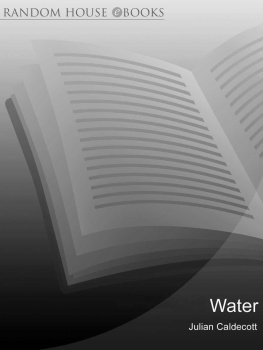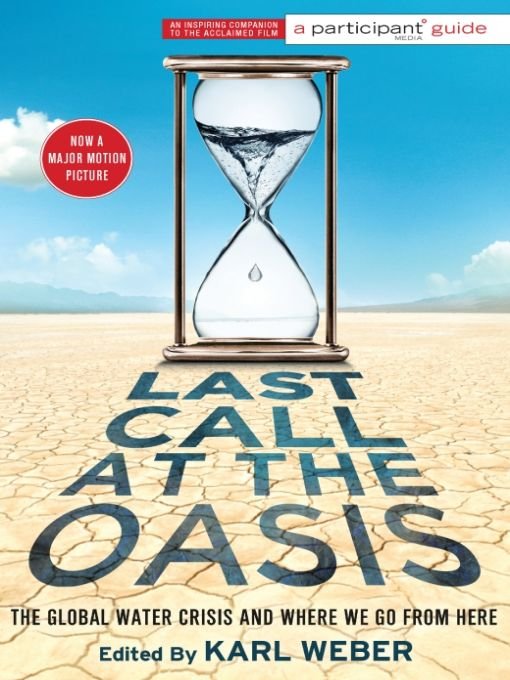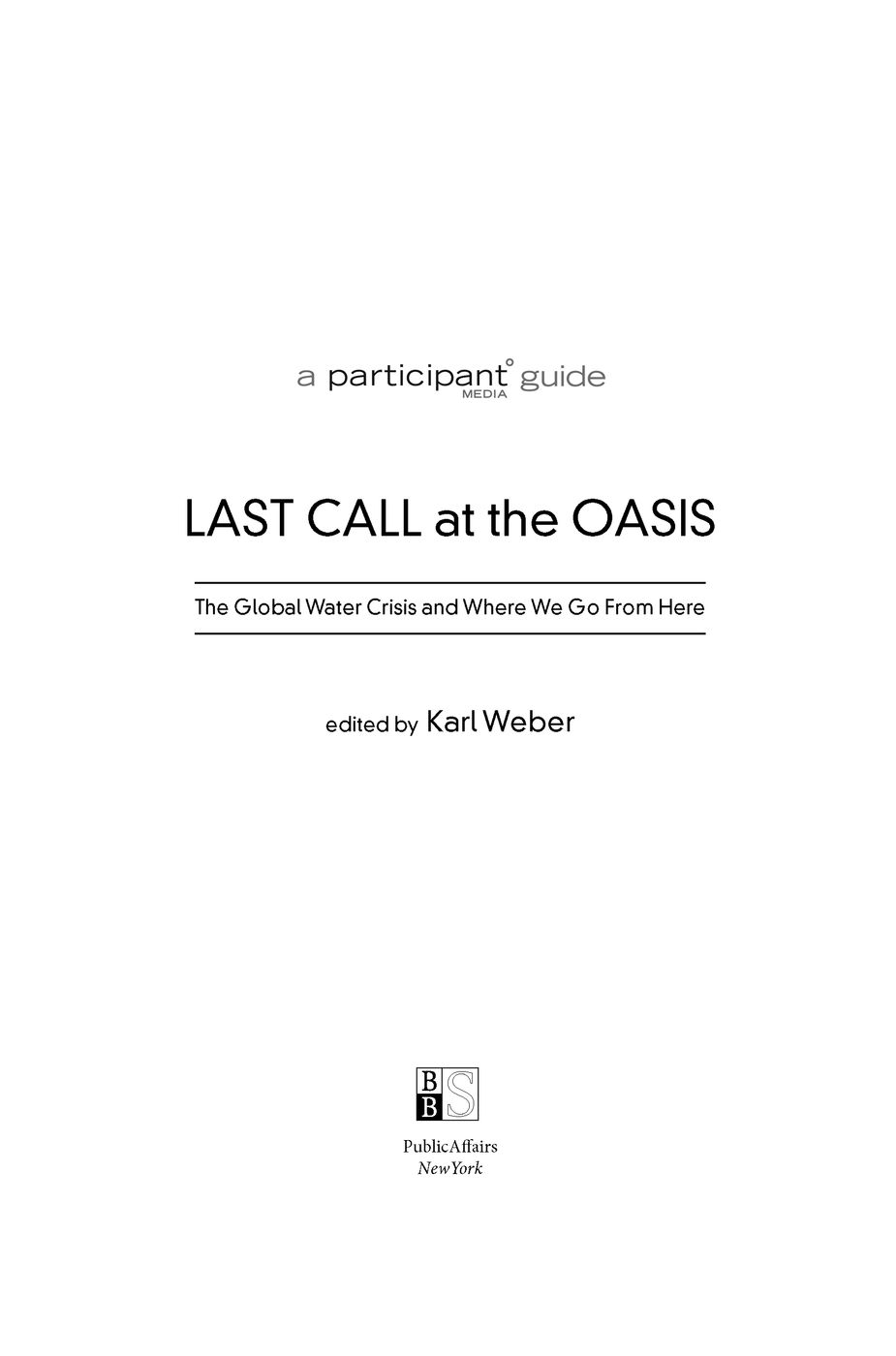Table of Contents
ALSO BY Participant Media
Page One
Waiting for Superman
Cane Toads and Other Rogue Species
Oceans
Food, Inc.
PREFACE
The headlines tell the story: Water Pollution Report Sends Shockwaves Through Shale Gas Industry; In China City of Four Million, No Water; Radioactive Water Spills at New Brunswick Nuclear Plant; Environmentalists Oppose Proposed Wyoming-to-Colorado Water Pipeline; Water Is More Important Than Oil for UAE: Mohammed bin Zayed; Water Risk to 500 Australian Farms, Dairy Industry Fears; New Reports Finds Aging Water Infrastructure Burdens US Economy; Spread of Fracking Leads to Fears of Water Shortages. Thats literally one days harvest of water-related stories from Google Newsand we stopped listing them because we got tired, not because we reached the end of the collection.
Water woes are everywhere, and in a host of forms: floods and droughts, shortages of potable water, pollution and contamination, overuse and misuse in developed countries, lack of access in developing countries, crumbling infrastructure, endangered water habitats, excessive and ecologically dangerous damming, political and military battles over water rights... the list goes on and on. This poses the question: How have we humans allowed ourselves to reach such a crisis point with one of the most vital necessities of life (second only to the air we breathe)?
Thats the question that the important new documentary film Last Call at the Oasis sets out to exploreand the same question we tackle in this book.
If youve seen the movie, youve probably picked up this companion book in hopes of learning more about the complex issues so vividly depicted by filmmaker Jessica Yu. If you havent seen the movie, we strongly recommend itand we hope youll also read this book to enjoy a deeper, wider-ranging exploration of many of the crucial water challenges our planet faces today.
Heres an overview of the books contents.
After a brief prologue, All Bets Are Off, which sets the stage through an excerpt from a prescient novel about a devastating water shortage in New York Cityoriginally published almost fifty years ago!Part One offers several perspectives on the worsening water crises the peoples of the world face. Water Realities presents a summary of key facts, statistics, trends, and relationships, painting a stark picture of our reliance on dwindling, endangered water supplies and the challenges well face in remedying the problem. In Exploring Oasis, director Jessica Yu describes the experience of researching and filming Last Call at the Oasis, and what she learned about the psychology of water useand water abusein the process.
Next, heroic pollution fighter Lynn Henning tells her own story in From Farmer to Water Activist, explaining how industrial farming is threatening an age-old way of life in Americas Midwestas well as the water supplies on which we all rely. In Clean WaterThe Price of Gold? hydrogeologist Robert Moran reveals how resource extraction industries such as energy and mining are damaging water supplies worldwide, and often doing so in near-total secrecy created by uncontrolled corporate power. Finally Alex Prudhomme, author of the book The Ripple Effect, which helped inspire Last Call at the Oasis, recounts his own education in the realities of the worlds water, and warns us that, as the title of his chapter states, theres No Time to Waste.
In Part Two of the book, we shift from reviewing the problems with water to describing possible solutions. First, todays leading expert on water and the environment, Peter H. Gleick of the Pacific Institute, explains his famous concept of the soft patha more sustainable approach to improving global water supply than traditional massive infrastructure projectsin his chapter A Way Forward? Then Gary White, CEO of Water.org, explains in In Our Lifetime how creative ways of thinking about, organizing, funding, and managing water projects can bring essential water resources for the first time to the billions of people in the developing world. In their chapter, Drawing Water, visionary designers Hadley Arnold and Peter Arnold describe their new approach to urban planning, which is already beginning to transform how western cities, such as Burbank, California, handle their precious water resources. And in her chapter, From Crisis to Competitive Advantage, Robyn Beavers explains how farseeing companies, such as Google, are recognizing the importance of sustainable water management and altering their resource-use policies accordingly.
Next, in Diamonds in Disguise, legal expert and acclaimed author Robert Glennon discusses the market and regulatory failures that underlie todays water crises, and explains how redesigned systems for organizing the distribution and use of water can encourage conservation and ensure that all people have enough water for their needs. Two chapters of highly practical advice come next. In Ten Simple Ways You Can Help Protect Our Water, the National Resources Defense Council offers ideas everyone can begin following today to reduce pollution and end needless water waste. And in Nine Ecofabulous Ways to Save Water at HomeAnd Do It with Style, Zem Joaquin offers tips for smarter ways of using water in your bathroom, kitchen, and elsewhere at home, including recommendations of new products and technologies that are making sustainable living not just practical but fun.
Finally, in Endless Resourcefulness, William McDonough, perhaps todays most acclaimed thinker about the relationship between humans and the planet they inhabit, offers a series of provocative, fascinating observations about the value of water and the power of intelligent design to enhance and expand that value. McDonoughs insights conclude Part Two on an optimistic note: water, he says, is a potentially infinite resourceproviding we have the wisdom and the will to use it correctly.
The last section of the book, Part Three, is a resource guide containing five annotated lists that readers wanting to get further involved in water issues will find useful. Included are a list of water-related organizations that deserve your support, lists of online information tools and activist campaigns youll find illuminating and inspiring, an annotated list of some of the best books about water and the global challenges we face in managing and conserving it, and finally, a hat-tip to the people who brought Last Call at the Oasis to a theater near you.
In the course of editing this book and working with the brilliant, committed authors whove contributed to it, Ive come to learn how complex, fascinating, and important are the water issues our species is grappling with. No single book could hope to capture every nuance of these issues. But I hope youll find Last Call at the Oasisthis book as well as the film of the same nameto be a valuable introduction to the challenges of water and a small but meaningful step toward discovering a more sustainable, water-friendly way of life for you, your family, and the larger human community.
Karl Weber
Irvington, New York
December 2011
PROLOGUE: ALL BETS ARE OFF
An Excerpt fromThe Day New York Went Dry
by Charles Einstein (1964)
Journalist, novelist, and screenwriter Charles Einstein (19262007) enjoyed a long and varied career working on both coasts of the United States. Today he probably is best remembered for his writing about baseball, particularly his coverage of the career of San Francisco Giants star Willie Mays for that citys


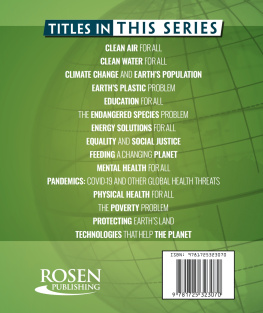
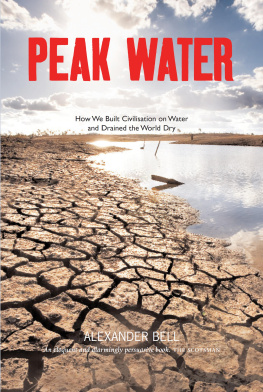
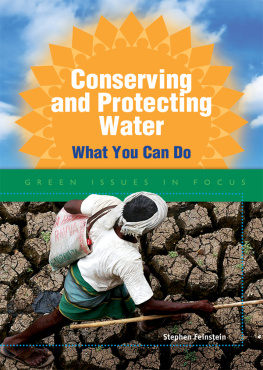
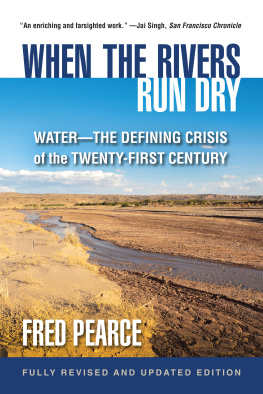
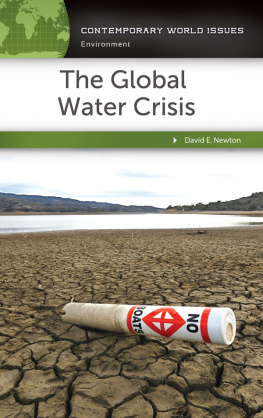
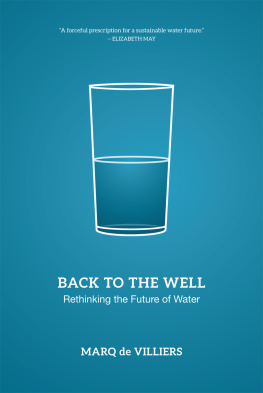
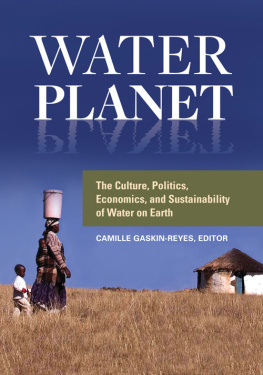
![David E Newton] - The global water crisis : a reference handbook](/uploads/posts/book/104432/thumbs/david-e-newton-the-global-water-crisis-a.jpg)
